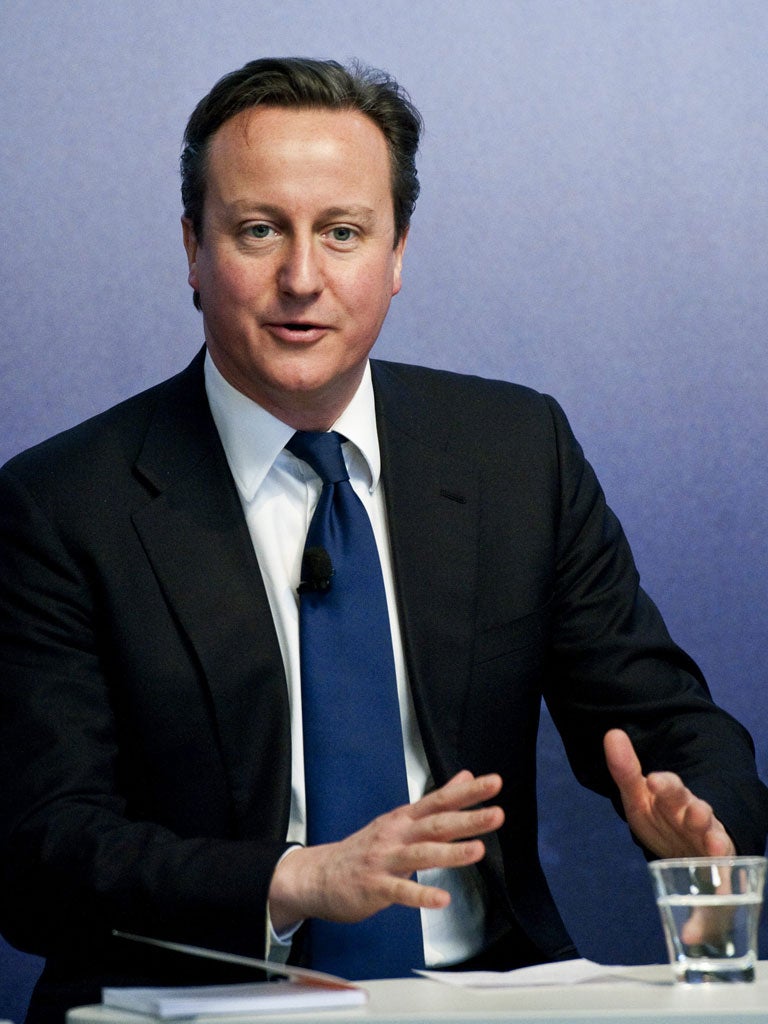Andrew Grice: Cameron could live to regret his reluctance to kill the Bill
Inside Westminster


"I hope I backed Andrew [Lansley] enough," David Cameron said after PMQs on Wednesday.
When Ed Miliband gave him a torrid time over his NHS reforms, Mr Cameron had meant to defend his troubled Health Secretary. He told Mr Miliband that Mr Lansley's career prospects were "a lot better" than the Labour leader's – hardly the most ringing endorsement.
That the Prime Minister intended to give Mr Lansley his full support is revealing. He is not going to be thrown overboard – not yet, anyway. Nor, it seems, is the Health and Social Care Bill. Mr Cameron, right, has a difficult dilemma. There are plenty of voices, including some Downing Street advisers and cabinet ministers, who want him to cut his losses, dump most of the Bill and salvage the elements that could be agreed with Labour. That would take most of the politics out of the NHS, giving Mr Cameron a valuable insurance policy at the next general election.
It looks tempting, because the Prime Minister has an aversion to retoxifying his party. But he has also developed an aversion to U-turns. Dropping the Bill at this late stage would be the mother of all retreats. Having gone through the pain barrier of a full-scale review last year to lose his nerve now would suggest he is being buffeted around by events. So the most likely course is for Mr Cameron to repeat the "sell-it-yourself" solution he adopted during last year's storm. Expect lots of TV pictures of the PM visiting hospitals, sleeves rolled up, with poor Mr Lansley following behind.
The latest wobble over the Bill has surprised ministers because it was filleted during last year's much-vaunted "pause". Many of the criticisms that have resurfaced in recent weeks were fully aired then. So what has changed? Crucially, most of the professional bodies representing those who work in the NHS have come out against the shake-up.
This is toxic for the Tories. As Mr Cameron knows, the public normally takes its cue not from what politicians say about the NHS but what the professionals say. That's why he and Mr Lansley cuddled up to them in opposition – reassuring them, by the way, that there would be no more top-down reorganisations like the one they are now trying to push through.
The latest wobble also poses a dilemma for the Liberal Democrats. They trumpeted the surgery given to the Bill last year as a great victory. In fact, George Osborne played an equally important role but was happy to let Nick Clegg get the plaudits after his defeat in the referendum. So it is hard for the Liberal Democrats to say the NHS changes are a disaster. Mr Clegg cannot easily join Labour in trying to "kill the Bill".
Last year's battle between the Coalition parties over the NHS reforms was the most public since the 2010 election – though it was rather stage-managed, a revolt by the smaller party licensed by the major one. Recently, the Liberal Democrats decided that they need to do more of what they call "differentiation" to show the voters they are not Tories. That is why Mr Clegg took the unusual step of making his demand for tax cuts in a speech rather than a private submission to the Chancellor.
Like the NHS row, that made headlines, but is the public getting the Liberal Democrat message? Party strategists admit they need to differ more loudly, that even the great NHS revolt passed many voters by. Mr Clegg has a difficult balancing act; he also needs to show that "coalition works".
So the Liberal Democrat plan is to set out some key disagreements in public so that, even if they don't get their own way, the public knows they are not Tories. At the same time, the two parties are discussing plans to set out the policies on which they do agree in an updated Coalition Agreement.
One of those areas will be health. But that has big dangers for both parties. The pressures for hospital closures in the run-up to the 2015 election will be enormous. A proper solution to the looming social-care crisis would require even more money to be taken out of hospital budgets so that more people can remain in their own homes. Waiting times for treatment will become a major issue again. The cuts will be blamed on the reforms, and will be laid at Mr Cameron's door. The man who described his top priority in three letters – "NHS" – might well look back on 2012 and wish he had "killed the Bill" after all.

Join our commenting forum
Join thought-provoking conversations, follow other Independent readers and see their replies